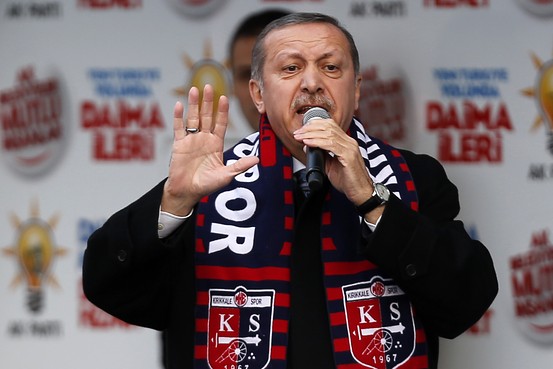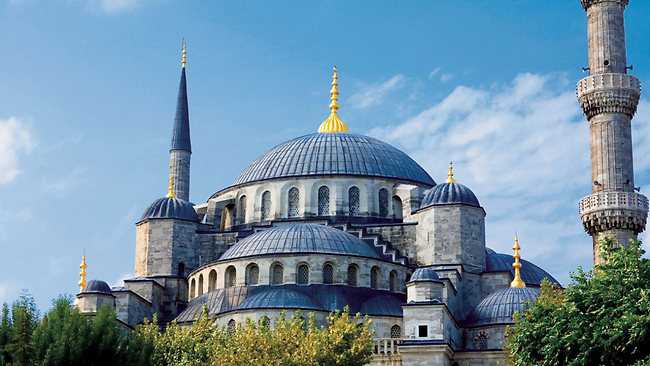
ISTANBUL–As Turkey prepares for crucial local elections March 30, the country has been convulsed by the release of recordings of private conversations of Prime Minister Recep Tayyip Erdogan and media executives, bureaucrats and businessmen.
Mr. Erdogan says his private conversations were wiretapped and confirmed the authenticity of some of the dozens of recordings, but says many have been edited to distort their meaning as part of a plot by his one-time political ally Fethullah Gulen, a U.S.-based Turkish imam with millions of followers. Mr. Gulen has repeatedly denied any involvement and the movement’s representative said on Monday he had “nothing to do with the tapes.” Mr. Erdogan’s spokesman did not respond to calls for comment.
The recordings have been posted on social media, including YouTube and TwitterTWTR +0.76%, by accounts with the usernames Haramzadeler (the Sons of Sinners) and Bascalan (the Prime Swindler), but no one has claimed responsibility. Here is a look at recordings that have received the most attention.
The Cash
The most explosive tape, published Feb. 25, purports to show a conversation between the prime minister and his son, Bilal, discussing how to hide tens of millions of dollars in cash stored in the family’s home. The tape was alleged by the Prime Swindler to have been secretly recorded on the morning of Dec. 17, the first day of a sprawling corruption probe in which dozens of the premier’s allies, including three former ministers’ sons, were arrested on allegations of corruption.
On the tape, a voice alleged to be that of the prime minister instructs a person identified as his son to get rid of all the money, preferably after dark to avoid attention. The other speaker, purportedly his son, says he has moved everything except €30 million ($41.6 million), which is proving difficult to shift.
The prime minister has labeled the recording an “immoral montage,” and voiced anger at having his phone secretly wiretapped. The younger Mr. Erdogan has remained quiet through the scandal, and did not respond to calls for comment through his wholesale food company.
Pro-government media went to recording studios in the U.S. and asked them to assess the tapes. Employees at the studios had no clue they had been involved in a Turkish political scandal, and though they reported the tapes had been edited they later said their analyses had been misused.
The Court Case
On March 4, the Prime Swindler published a tape accompanied by tweets alleging it showed that Mr. Erdogan meddled with a high-profile tax case against a government critic five years ago. Mr. Erdogan appears to tell Turkey’s then justice minister, Sadullah Ergin, of his disappointment with the acquittal of media mogul, Aydin Dogan, in a trial over price gouging.
The prime minister appears to complain that Mr. Ergin had not followed the case closely enough. The men then appear to discuss in detail the prospects for reversing the decision.
A person close to Mr. Dogan said the case apparently discussed on the tape concerned charges brought against his company by Turkey’s Capital Markets Board for allegedly causing losses to investors by overcharging its subsidiaries for products sold by a Dogan-owned firm. The case continues despite the company being acquitted several times in separate courts, the person said.
Mr. Dogan, who was involved in a public row with Mr. Erdogan, has also received a handful of fines over tax irregularities that included one for $2.5 billion. They were eventually reduced by a large amount through court appeals and a government restructuring program.
Mr. Dogan’s company issued a statement the day after the tape was released, saying it would “further shake the judicial system in Turkey” if it was authentic.
Last week, Mr. Erdogan confirmed he discussed the case with Mr. Ergin, but said “it was only natural” to urge the justice minister to follow it more closely because it contained “dangerous” details, though he did not elaborate on what they were. He says the recording was “put together piece by piece.”
In an interview last week with CNN Turk, Mr. Ergin said the conversation was taken out of context by editing, and that he and Mr. Erdogan were discussing complaints over alleged manipulation of court documents they were trying to figure out how to correct.
The Ship Contract
On March 4, the Prime Swindler published a tape and alleged it contained conversations between Mr. Erdogan and a shipyard owner, Metin Kalkavan, in which the prime minister appears to manipulate a tendering process.
The Prime Swindler alleged the conversation was recorded shortly after the Turkish military awarded a $2.5 billion warship-construction contract to Koc HoldingKCHOL.IS +0.49%, a Turkish conglomerate that criticized Mr. Erdogan’s government during antigovernment protests last summer.
In the recording, Mr. Kalkavan, owner of the Sedef Gemi Insaat shipbuilding company, appears to tell Mr. Erdogan he had not officially applied for the bid in writing, but the premier tells him he should formally complain about an unfair bidding process. Mr. Kalkavan appears to promise he would enter a bid if it were reopened.
In the end, the bid was canceled and the contract was taken up by the Turkish navy, which has started work on building the ships.
Shortly after the cancellation, a separate $3 billion government shipbuilding contract was offered to Mr. Kalkavan and Spanish Navantia, a Spanish state-owned shipbuilding company.
Last week, Mr. Erdogan confirmed at least part of the recording, saying it was natural for him to advise someone to file a complaint to reverse wrongdoing. “As a result of the lawsuit, the bid is canceled. And the state earns a hundred, two hundred million dollars,” he said, in a reference to the navy contract.
“They are as lowly as to wiretap this conversation,” he said in a televised speech, referring to followers of Mr. Gulen.
According to the state-run Anadolu news agency, Mr. Kalkavan confirmed the conversation, but stressed it was “wrong to make conclusions based on just some parts of it.” A spokesman for Spanish Navantia said the company had no doubt it won the tender based on the strength of its product.
The Media
The Sons of Sinners published a series of tapes, the first on Feb. 4, in which government officials allegedly order media bosses to change headlines, censor opposition politicians’ speeches and write stories planted by officials. According to the tapes, the orders were apparently executed without resistance.
Mr. Erdogan did not challenge their authenticity and directly confirmed one recording in which he personally called a media executive to order the removal of headlines from an opposition speech as he watched them airing on TV. “Yes, I made the call… because there were insults against us, against the prime minister… and they did what was necessary,” Mr. Erdogan said in televised remarks mid-February. “We have to also teach them these things. Because the insults were not normal.”
The content of many tapes was confirmed by Turkish editor in chief Fatih Altayli, who said in a television interview that the government would regularly interfere with the content published in his newspaper, Haberturk.





